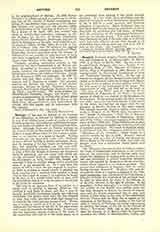

Beugnot, AUGUSTE-ARTHUR, COUNT, French historian and statesman, b. at Bar-sur-Aube, March 25, 1797; d. at Paris, March 15, 1865. He was a son of Jacques-Claude Beugnot, who was a Deputy in the Legislative Body of 1791, Minister of Finance to Jerome, King of Westphalia in 1807, Minister of the Interior under the Provisional Government of 1814, and Postmaster General in 1815. At the age of twenty-one Auguste-Arthur Beugnot made known his ability as an historical writer by dividing with Mignet the prize of the Academie des Inscriptions (1818) for the best essay on the institutions of St. Louis. The competitions of 1822 and 1831 led to his work on “The Jews of the West” and his “History of the Destruction of Paganism in the West”, in consequence of which he was elected to the Acadi mie des Inscriptions. To the general public the latter of these two works was more especially known; it was placed on the Index, and has lost its vogue since the appearance of Seeck’s treatise on the same subject. The learned, however, attach a higher value to the works of Beugnot on the Middle Ages; his editions of the “Assizes of Jerusalem” (1841-43), of Beaumanoir’s book of the “Customs of Beauvaisis” (1842), and of the “Olim”, or ancient registers of the Parliament of Paris (1839-48). These editions are of great value for the history of feudal and customary law, and of juridical procedure. The name of Beugnot, lastly, is associated with the voluminous publication of the “Historians of the Crusades“, which began in a memoir written by him in 1834. Beugnot entered politics in 1841 as a Peer of France, was Deputy for Haute-Marne in the Chamber of 1849, and under the Empire went into a retirement which lasted until his death.
The Villemain educational plan of 1844, to subject the heads of independent institutions to the jurisdiction of the university, and to impose upon their pupils the obligation of making their studies in rhetoric and philosophy in certain prescribed establishments, was opposed by Beugnot on liberal principles, whilst others opposed it on religious grounds. This project was withdrawn in January, 1845, its author having become demented. Beugnot, who had destroyed the draft of a speech in support of the Ville-main program, was welcomed by the Catholics as a laborer entering the vineyard at the eleventh hour. In 1845 he advocated the claim of the bishops, as of all other citizens, to the right of petition. In his pamphlet, “L’etat theologien”, he made it clear that the attacks on the Jesuits were neither more nor less than attempts to destroy the liberty of association, and the Jesuits empowered him to treat with Guizot in their name at the time of the negotiations between France and the Holy See in regard to the dispersion of the Society. As drafter of the Law of 1850 on Liberty of Teaching, he vainly endeavored to prevent the return of the bill to the Council of State, November 7, 1849, and in the decisive debate (January 14 to March 15, 1850) he vigorously seconded the efforts of Montalembert, Parieu, and Thiers which resulted in victory for the Church and liberty.
GEORGES GOYAU

